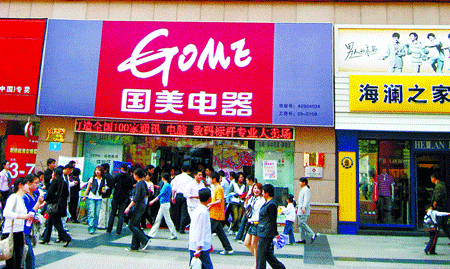Domestic
Gome to raise HK$3.24b via bonds, shares
By Ding Qingfen (China Daily)
Updated: 2009-06-23 08:01
|
 |
|
Troubled consumer electronics retailer Gome is raising funds through a private placement of bonds and new shares to help solve some of its cash flow problems. [CFP] |
Gome Electrical Appliances, China's largest consumer electronics retailers by store numbers, yesterday said it would raise no less than HK$3.24 billion by issuing convertible bonds to private equity firm Bain Capital LLC and also offer new shares that qualified shareholders including Bain Capital could subscribe to.
The move is expected to inject fresh capital to the company, which has been troubled by cash problems since late last year when its founder Huang Guangyu was taken into police custody for alleged share trading irregularities. The funds would also help Gome fend off the increasing competition from archrival Suning, the second largest consumer electrical retailer.
Gome shares, which have been suspended since Nov 24 last year, are set to resume trading from today.
According to the company's announcement, Bain Capital will subscribe to HK$1.8 billion seven-year convertible bonds that can be converted into Gome shares equivalent to 9.8 percent of the company's enlarged share capital.
| ||||
Following the fund raising Bain Capital may end up having a stake of between 9.8 to 23.5 percent in Gome, depending on how much shares the other shareholders end up subscribing to.
But what is certain is that Bain Capital has emerged as Gome's second largest shareholder, after Huang.
The founder originally held 35.55 percent share in Gome, and it is estimated that his share will be diluted to around 30 percent after the deal.
"The deal is a milestone for Gome. We will be entering into a faster growth track," said Chen Xiao, chairman, Gome.
Last November, Huang was placed under investigation for alleged share trading irregularities, and since then, the company has been facing cash flow problems as commercial banks were not keen on lending to Gome due to fears over the negative impact of the scandal.
The company's shares had also kept falling before suspension. Gome shares closed at HK$1.12 on Nov 21, from a high of HK$21 a year ago.
Since late last year, Gome had hinted about the possibility of a share sale to help access capital, and more importantly, to break out of the shadow of Huang who is still in police custody.
But the proceeds Gome is raising this time seem to be far from enough. According to the corporate announcement, the company must repay 4.6 billion yuan worth in convertible bonds in May next year. And more than that, Gome said early this year that it would spend huge amounts on store transformation projects to increase its corporate profitability.
He Yangqing, Gome's spokesperson, told China Daily that, the deal would help the company win quite a lot of confidence from investors, suppliers and commercial banks. "The confidence means cash, so we should not worry too much about it," he said.
During the past two decades, Bain Capital has been focusing on investing in four specific areas, including retail sector. "The rich experience we have will certainly help Gome sharpen its competitiveness in management and governance," said Zhu Jia, manager director of Bain Capital.
Since late last year, Suning, which had 850 stores by the end of 2008, has been stepping up efforts to expand its network and enhance its capability, in a bid to dethrone Gome. In 2007, Gome had a 40 percent share, while Suning held around 7 percent.
In 2008, Suning, for the first time, surpassed Gome in both profit and sales.













